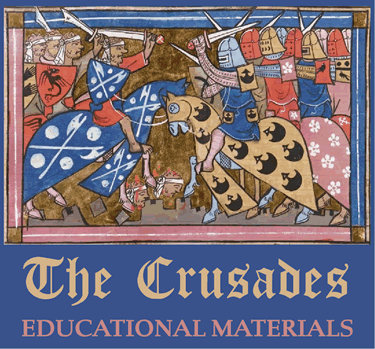 |
| Crusades Educational Materials |
|---|
| www.studenthandouts.com ↣ World History ↣ Crusades |
|---|
| Crusades Worksheets | Crusades Maps and Pictures |
| Crusades Miscellany | Crusades Outlines and PowerPoints |
| Crusades Books and Films | Crusades Study Games |
|
The Crusades were a series of religiously motivated military campaigns launched by Western European Christians between the 11th and 13th centuries to capture the Holy Land (Jerusalem and the surrounding areas) from Muslim control. These campaigns had a significant and lasting impact on European history for several reasons. Cultural Exchange: The Crusaders' interactions with the Eastern Mediterranean cultures exposed Europeans to new ideas, technologies, and goods. This cultural exchange contributed to the Renaissance in Europe, sparking intellectual and artistic advancements. Trade and Commerce: The Crusades stimulated trade between Europe and the East. Crusaders returning from the Holy Land brought back spices, textiles, and other exotic goods. This trade expanded Europe's economic horizons and contributed to the growth of merchant classes and commercial centers.  Feudal Decline: The Crusades required significant resources, leading to the mobilization of knights and nobles for these campaigns. As a result, the feudal system declined, and monarchs gained more centralized power and control over their realms.
Feudal Decline: The Crusades required significant resources, leading to the mobilization of knights and nobles for these campaigns. As a result, the feudal system declined, and monarchs gained more centralized power and control over their realms.Religious Zeal: The Crusades reinforced religious fervor in medieval Europe. The Church played a central role in promoting and financing these campaigns, solidifying its influence over both spiritual and secular matters. Military Technology: Crusaders encountered advanced military technologies, tactics, and strategies in the Muslim world. They adopted and adapted some of these innovations, which influenced the development of European military methods. Urban Growth: The influx of wealth from the Crusades contributed to the growth of European cities. Trade and commerce flourished, leading to the expansion of urban centers and the rise of the urban bourgeoisie. Religious Tensions: The Crusades created long-lasting tensions between Christians and Muslims, which would continue for centuries and influence later events, including conflicts in the Mediterranean and the Middle East. Intellectual Exchange: Crusaders returning from the East brought back not only physical treasures but also books and knowledge from Islamic scholars. This exchange of ideas contributed to the intellectual and academic growth in Europe. Decline of Byzantium: The Fourth Crusade (1202-1204) resulted in the sack of Constantinople, the capital of the Byzantine Empire. This weakened Byzantium, paving the way for the eventual conquest of the city by the Ottoman Turks in 1453. Legacy of Religious Warfare: The concept of holy war became ingrained in European history, leading to later religious conflicts and the Inquisition. The Crusades set a precedent for religiously motivated warfare that would have repercussions for centuries. Long-Term Impact on the Middle East: The Crusades had a profound and enduring impact on the Middle East. They left a legacy of distrust and hostility between Christian and Muslim communities, contributing to conflicts that continue to the present day. The Crusades were a turning point in European history due to their far-reaching consequences on culture, trade, politics, religion, and military affairs. They marked a period of intense interaction between Europe and the wider world, shaping the course of European development and leaving a lasting impact on subsequent historical events. |
| www.studenthandouts.com ↣ World History ↣ Crusades |
|---|








